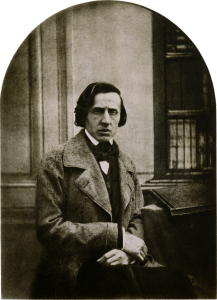Weeping with Chopin
ēʹ-mō: adj. (informal) emotional; sensitive.
If you think emo is a recent musical development, think again. Chopin was emo way before it was cool: the cold, dark eyes, the gentle scowl. Just comb that hair a little more over one eye, and he’d pass for any modern heartthrob.
Seriously though, his music is so beautiful it hurts; his nocturnes for solo piano completely embody the romantic spirit: a lonely artist, a dark night, a single candle resting on the piano, a glass of wine, the light of a pale moon, a cool breeze, a silent world, except for a sensual, delicate, introspective melody that simply floats through the midnight air. You begin to cry without explanation; your soul mourns for something it never knew it lost!
Ok, so I got a little carried away. All joking aside, this is some of the finest stuff ever written. And I do find it’s a perfect soundtrack to the lonely midnight hours.


Recent Comments